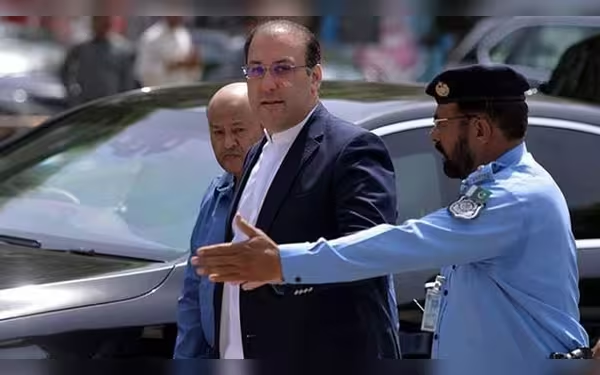Monday, December 23, 2024 12:22 PM
Sharif Family Responds to Hasan Nawaz Bankruptcy Ruling
- Hasan Nawaz's company declared bankrupt by UK court.
- Sharif family claims bankruptcy exempts tax obligations.
- Political opponents challenge family's narrative on financial struggles.
 Image Credits: thenews
Image Credits: thenewsThe Sharif family reacts to Hasan Nawaz's company bankruptcy ruling, asserting tax exemptions and facing political criticism.
LONDON: The Sharif family has recently made headlines following a UK court ruling that declared Hasan Nawaz's company bankrupt. This decision has sparked a significant reaction from the family, who assert that companies facing bankruptcy are exempt from paying taxes. This claim was reiterated by a spokesperson for the family, emphasizing their perspective on the legal and financial challenges they have faced over the years.
Hasan Nawaz, the son of former Prime Minister Nawaz Sharif, found himself at the center of this legal battle, as the London High Court ruled against his company in a tax and liability case. According to court documents, a bankruptcy order is a formal declaration issued by the court, marking an individual as bankrupt. In the UK, such orders are published in the London Gazette only after being received from The Insolvency Service. Once declared bankrupt, an individual cannot serve as a director or manage a company unless they receive permission from the court. Despite this ruling, Hasan Nawaz continues to hold directorships in several UK companies.
The spokesperson for the Sharif family provided a historical context to their financial struggles, tracing back to 1972 when the nationalization of industries under Prime Minister Zulfikar Ali Bhutto adversely affected their businesses. They also recalled the hardships faced during General Pervez Musharraf's regime, which included the confiscation of their homes and the sealing of their factories. The spokesperson claimed that the family has been subjected to financial crises on four separate occasions, suggesting that these events were orchestrated to penalize them.
In a show of resilience, the Sharif family reiterated their commitment to Pakistan, stating that they have always prioritized the nation and its principles, even at the cost of their personal financial stability. They believe that their sacrifices have been for the greater good of the country.
However, the situation has drawn criticism from political opponents. PPP leader Nadeem Afzal Chan publicly challenged the Sharif family's narrative, questioning the relevance of the Bhutto era in the context of their current bankruptcy declaration. Chan stated, "You are declaring bankruptcy today, and that too in the UK. How is the Bhutto era relevant here?" He accused the Sharif family of using bankruptcy as a means to evade tax obligations, asserting that their practices in the UK mirror those in Pakistan. Chan further claimed that he could reveal more about the situation if not for the restraint imposed by his party's leadership.
This unfolding drama highlights the complexities of financial and political dynamics in Pakistan. The Sharif family's long history of challenges serves as a reminder of the intricate relationship between politics and business in the country. As the situation develops, it raises questions about accountability and the implications of financial decisions made by influential families. The public continues to watch closely, as the outcomes of such cases can have far-reaching effects on the political landscape and the economy of Pakistan.













